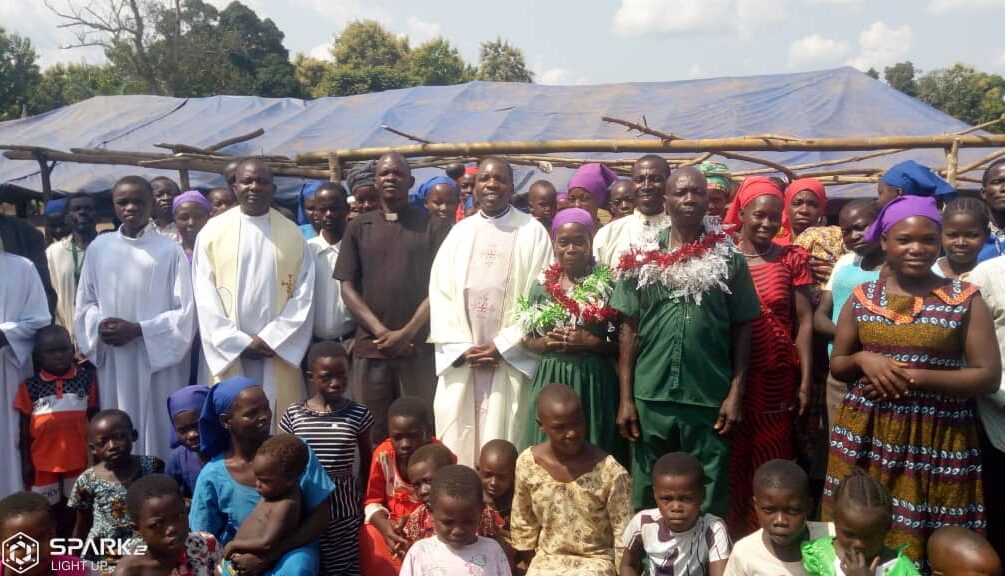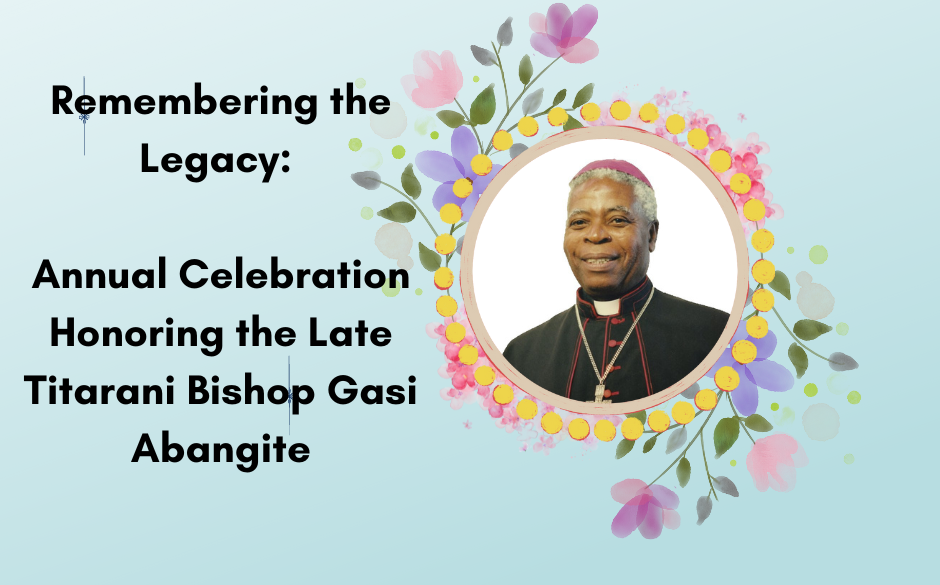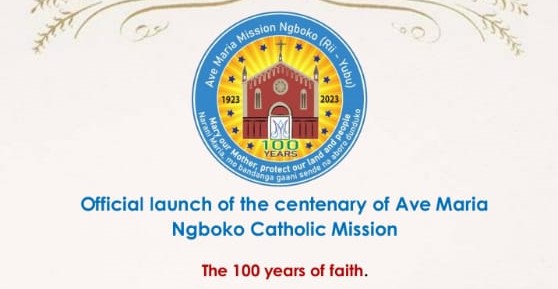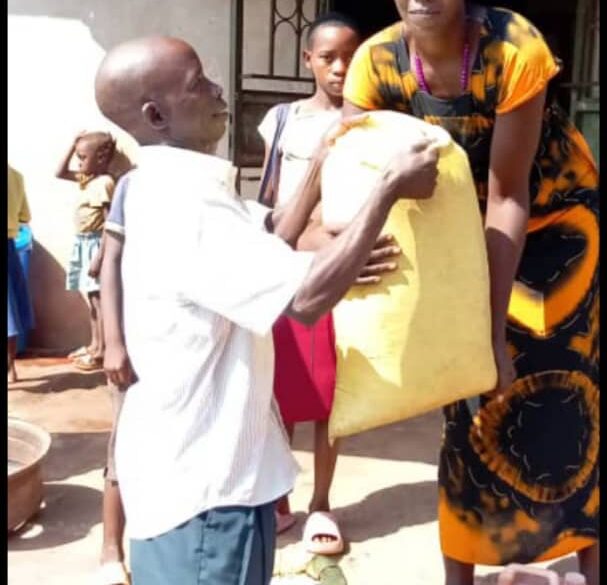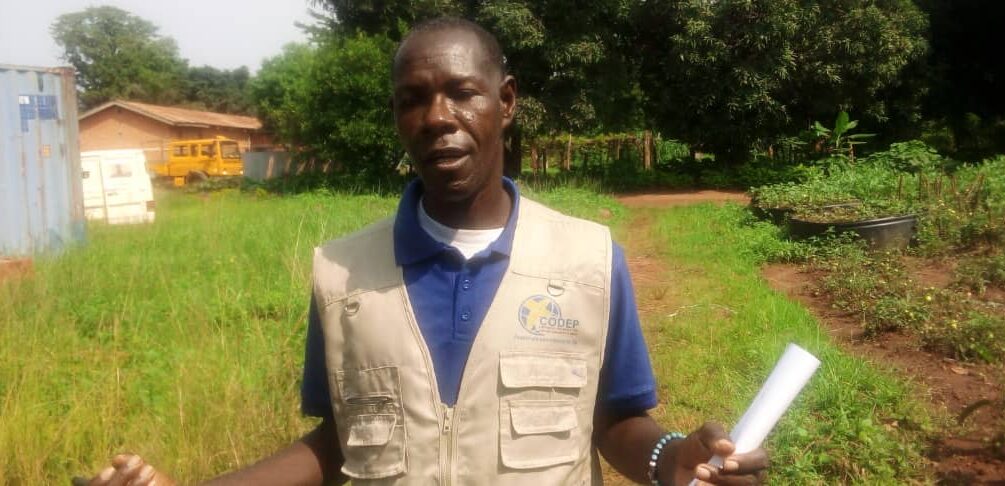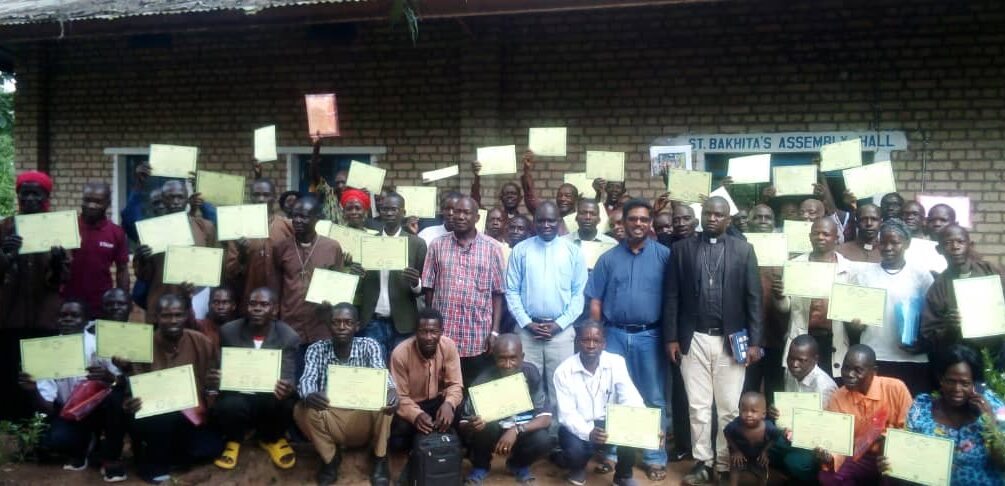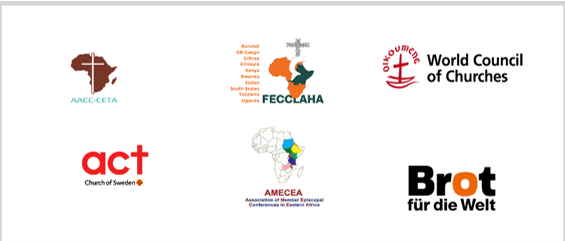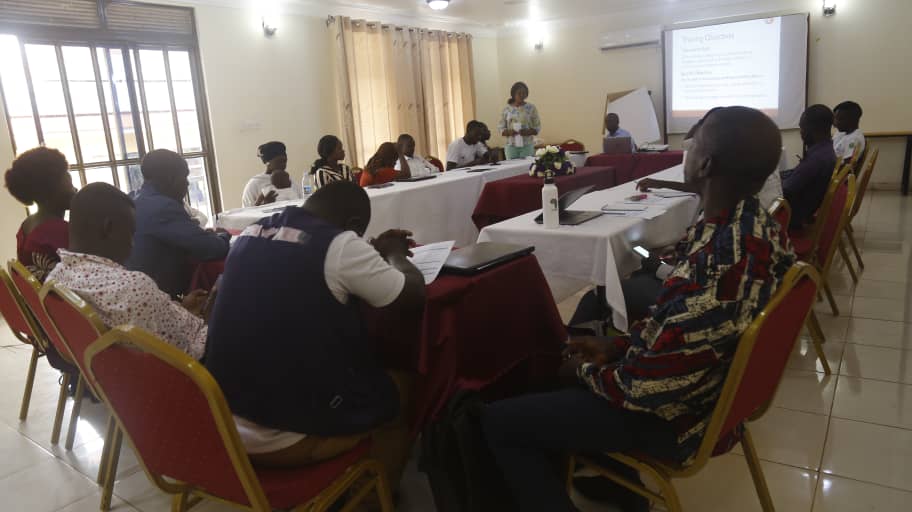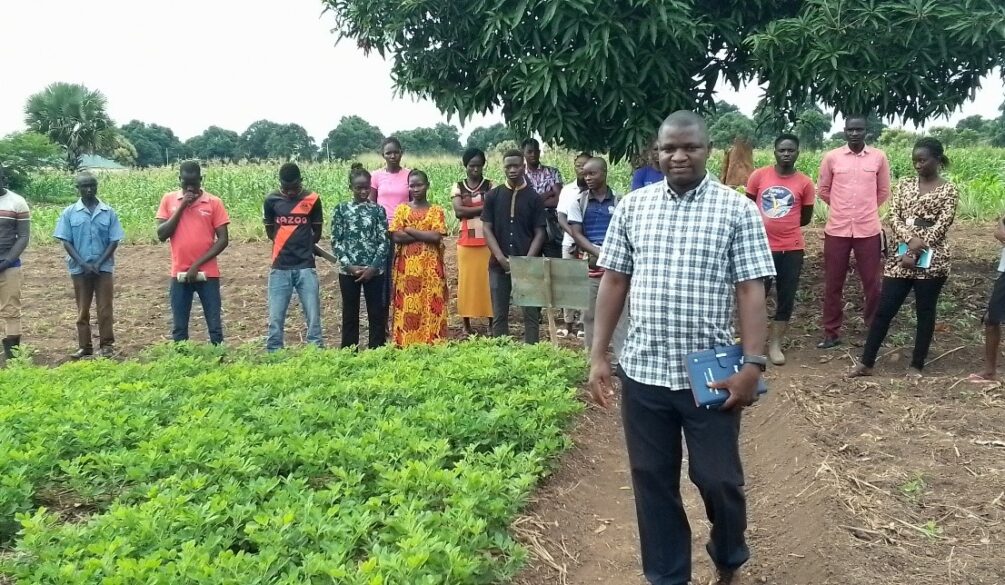“HUMEKODA BEE & HUMEKODA BERA Initiative”, Well Embraced by Christians of Riimenze Parish
By Sr. Henriette Anne FSSA
Hume Koda Bee and Hume Koda Bera also known as Diocesan Family Day is an initiative initiated to support the development of the Catholic Diocese of Tombura Yambio (CDTY) and to help the bishop in his pastoral ministries.
According to Fr. Charles Mbikoyo, the Parish Priest of Riimenze Parish, the Christians of Riimenze are embracing the initiative gradually. He explained that last Sunday he was at Bodo Center fundraising for a concrete shelter for prayers and Christians supported the idea.
In an online interview with Fr. Elia Kanido Alfred Zomai, the Administrator of Hume Koda Bee-Bera noted that as a committee, they have a jam-packed program planned for the annual family day.
“This year, we are sending our representatives to different parishes two by two to different deaneries to explain to our Christians the importance of the power of contributing with heart and mind”.
This year the initiative is asking for the support of; Lectionaries, Prayer books, Catechism of the Catholic Church, Rites for celebrating Sacrament, Certificates for the Sacraments/Baptismal Cards, and Hymnals/songs books.
The diocese has invited all Christians and people of goodwill to come and support the CDTY and the celebration is set to be on 14th, September 2023, at St. Mary Mother of God Catholic Parish, Yambio.
2023
Remembering the Legacy: Annual Celebration Honoring the Late Titarani Bishop Gasi Abangite
By Sr. Henriette Anne FSSA
The annual anniversary of the late Joseph Gasi Abangite is set to be on 13th September. Bishop Gasi who passed away on 12 September 2014 had been at the helm of the Catholic Diocese of Tombura Yambio (CDTY) since his Episcopal Ordination in April 1975. He retired in April 2008 at the age of 80.
In a statement received by Rurugene Online Newsletter Monday, August 8, Bishop Eduardo described the late bishop Gasi as “a true ambassador of peace and safeguard of admired moral life” that his day is worth recalling.
“A solemnity in our diocesan standard of recalling Bishop Gasi’s way a true ambassador
of Peace and Safeguard of admired moral life”.
In his statement, he urged all Christians together for the festive and ask for peace and love for their Nation since where there is love, there is peace.
“Let us gather these festivities and ask for peace and love for our Nation and our diocese as well as the world. Where there is love, there is peace. So let us go to the root and ask for the grace to live an authentic love that will always be accompanied by the fruits of true peace”.
In his August 8 message, Bishop Eduardo reminded the community of CDTY of the principles that were most dear to Titarani Joseph Gasi.
“We know that among the principles most dear to Titarani Bishop Gasi was that of charity, love of God, love of neighbor, love of the Fatherland and motherland. Love that he lived on a true path of interior conversion. Thus, we read in the Informative Ordinary Process that Titarani Bishop Gasi Abangite avoided discord and disputes, and one of his resolutions was to do the will of others rather than his own. He also resolved “to guard his tongue carefully, and vowed, at the age of 12, not to utter with inadvertence and deliberation of any bad, useless or idle word. Moreover, he abhorred “offense against the honor, reputation, and peace of his neighbor”, and “in his numerous correspondences, which go from one end of his life to the other, he never gives his advice or warnings the form of irony, or at least of hurtful irony.” He often sighs, whatsoever be the case”.
Bishop Eduardo added, “We are also familiar with this precious advice from Titarani Joseph Gasi Abangite Father de C addressed to his faithful in Yambio after the tribal conflict in Yambio: “Have a tender and pure charity for your enemies; pray in particular for those who may have been the cause of what you are suffering…” His “evangelical revenge plot”, which follows this same principle of praying more for those who are the cause of our suffering, is also very familiar to us” stressing that his beautiful and courageous inspirations are rooted in his capacity for inner silence, hi attentive listening to the Holy Spirit, and his docility to live according to his inspiration.
He called upon the Christians to be encouraged by the words of the late Bishop Gasi and ask the Lord to bless them with peace so that peace may be spread to all, especially to their families, diocese, state, and the whole world.
He continued, “In the footsteps of our holy Pioneer Titarani Bishop Gasi Abangite, let us ask for the grace to live in attentiveness and dependence on the Holy Spirit, love of God, and love of others, so that, whatever the places and circumstances of our lives, we may be peacemakers.
The celebration will begin with Holy Mass to be presided over by the Local Ordinary of the CDTY Bishop Eduardo Hiiboro Kussala.
Rev. Joseph Gasi Abangite was born in January, 1st 1928, ordained as a priest on 21st December 1957, appointed to be the Bishop of Tombura-Yambio on 12th December 1974, ordained and installed as a bishop on 6th April 1975 at the age of 47. He retired as a bishop on 19th April 2008 at the age of 80 and died on 13th September 2014.
2023
“Spiritual Growth and Academic Triumphs Illuminate Tombura-Yambio’s Century of Faith”
By Sr. Henriette Anne FSSA
“Delayed but Unyielding: Tombura-Yambio Gears Up for Grand Centennial Faith Celebration”
A momentous occasion is on the horizon – the 100-year celebration of Faith in Rii-Yubu. The air is charged with anticipation and every corner of the diocese is bustling with preparations for the grand event.
As the calendar turned to a new year, the CDTY leaders had hoped to launch the celebration, but unforeseen circumstances had pushed the event to December 2023. While it may have been a delay, it only added to the fervor that was building up. The Arrival to Rii-Yubu for the launching is scheduled to be on December 2nd, and the Celebration would culminate on December 11th, ten days of jubilation and spiritual enrichment.
Bishop Eduardo in his Monday 7th statement encouraged all the members of CDTY to honor the event with various activities that resonated deeply within the community. Parishes, institutions, and individuals are all encouraged to contribute in their own unique ways. It is a chance to showcase their unity, creativity, and unwavering faith.
“Priests of Promise: Tombura-Yambio’s Spiritual Leaders Embark on Philosophical Journey”
Amidst the preparations, four respected priests – Rev. William Abbas, Rev. Fr. Emmanuel Mborimbuko, Rev. Fr. Emmanuel Birandukuo, and Rev. Fr. Luke Paingbafuyo – had been chosen for a special opportunity. The St. Arruppe Jesuit Catholic University Harare Zimbabwe had opened its doors for these priests to study Philosophy. This is an academic endeavor; it is an opportunity to deepen their spiritual understanding and enrich their service to the community.
As Rev. Fr. Birandukuo is in the recovery process after illness, Rev. Abbas will take off for his journey in January 2024. Meanwhile, Fr. Emmanuel Mborimbuko and Fr. Luke Paingbafuyo had already embarked on a new chapter. With admission tests passed, they are set to leave for Zimbabwe in early August, “let’s pray for them and for our diocese for more priests”, Bishop added.
“Homecoming Heroes: Six Seminarians Set to Return to Tombura-Yambio After Studies”
But that wasn’t the only good news. Six major Seminarians, who had ventured to Europe and Juba for their studies, will be completing their studies and returning to the diocese. Their homecoming is a testament to their dedication and resilience.
“Rev. Fr. Alfred Basana Triumphs in Rome, Set to Illuminate Tombura-Yambio”
Another esteemed figure, Rev. Fr. Alfred Basana, had successfully completed his studies in Clinical Psychology in Rome. As the year drew to a close, he is set to return to the diocese in December 2023, equipped with new insights that would undoubtedly benefit the community.
“Path to Peace: Rev. Fr. Abraham Abayo to Join Juba University’s Peace Studies Program”
And the spirit of learning continued. Rev. Fr. Abraham Abayo, with the blessings of God, is gearing up to begin his Degree Program in Peace Studies at Juba University Peace Institute and Conflict, in September 2023. It is a step toward fostering harmony and understanding in a world often marred by conflict.
Fr. Raphael Diko and Philosophy Scholars Take the Next Step
On the same breath, Rev. Fr. Raphael Diko is on the cusp of a new academic journey. September marked the beginning of his Master’s Degree in Education at Makerere University in Uganda, a path that promised to enhance his ability to guide and educate the younger generation.
“Enlightenment Beckons: Tombura-Yambio’s Philosophers-to-Be Embark on Roman Exam”
The pinnacle of this educational fervor has been reached, the Philosophy students from the St. John Paul II Institute have completed their four-year curriculum. Their dedication has brought them to the cusp of an important milestone – the BA examination from Urbaniana University in Rome, scheduled for the end of September 2023, in Yambio.
The story of CDTY is one of unity, growth, and dedication. As December approached, the 100-year celebration of Faith in Rii-Yubu is not just an event; it is a testament to the unwavering spirit of a community bound by faith and the shared pursuit of knowledge and enlightenment.
2023
“Paying School Fees in Kind”: An Alternative Payment Method Adopted by Anisa Junior School
A parent in Yambio County has resorted to paying school fees for his primary school children inform of foodstuffs.
“Paying school fees in Kind,” typically refers to a form of payment made with goods or services instead of traditional currency. This practice is not very common and usually occurs in specific situations or under certain circumstances.
Mr. Dominic Peter Irisongba, a parent of three children studying at St. Gabriel Anisa Junior School while handing over the stuff in the morning Monday 17th, 2023 said, he brought items because he doesn’t have cash at hand to pay his children to school with the foodstuff in form of school fees.
“I have three children studying at St. Gabriel Anisa Junior Nursery and primary school, I decided that since I don’t have money to pay, I asked the school administration if I could bring food items instead of money to enable my children to stay in school and learn so that they may have a better future”, Mr. Irisongba stated.
The head Teacher of St. Gabriel Anisa Junior School, Mr. Elias Ginana Mangbondo said that the management of the school is very happy with the move taken by the parent to help learners.
“In our school, we decided and agreed together with our parents, we have seen the situation of our parents who are sending their children to our school, and we decided to give ample time and opportunity to each and everyone that, if you don’t have cash, please whatever you have in kind bring it, we shall take it and register your child”, Mr. Ginana said.
Regina Tamaregu Dominic a daughter to Mr. Dominic applauded her father for his care towards her education.
“Thank you I am Regina Temeregu, I am very happy because my father has come to pay our school fees, he brought Cassava flour and palm oil, I am very happy and my thanks go to my father and my mother, I also thanked my teachers, I am in class two. I came to give thanks here because I want to study to become a reverence Sister in the future”, Regina narrated.
Mr. Dominic thanked the administration of St. Gabriel Anisa Junior School for accepting the food items.
St. Gabriel Anisa Junior School is under the Catholic Diocese of Tambura Yambio located in the Ikpiro Yambio suburb.
“Paying in kind” means providing something of value that can be used or consumed by the recipient. Instead of paying with money, individuals may offer goods or services that the school or educational institution can utilize. This could involve various arrangements, depending on the agreement between the parties involved.
Here are a few examples to illustrate how paying school fees in kind might work:
- Bartering: Instead of monetary payment, parents or guardians might negotiate with the school to exchange goods or services. For instance, a parent who owns a bookstore might provide a certain number of books to the school library in exchange for their child’s tuition.
- Skills or expertise: In some cases, parents or community members may offer their professional skills or expertise to the school in lieu of monetary payment. For example, a parent who is a qualified electrician might provide electrical maintenance or repair services to the school.
- Goods or supplies: Parents might contribute specific goods or supplies that the school needs. This could include textbooks, stationery, sports equipment, or any other items that the school requires for its operations. The value of these goods is considered as payment for the fees.
- Fundraising and volunteering: Schools may organize fundraising events or programs where parents, students, and community members can participate. By contributing their time, effort, or resources to these initiatives, individuals can help generate funds for the school, which can then be used to cover their children’s school fees.
It’s important to note that paying school fees in kind is not a universally accepted practice and largely depends on the policies and discretion of the educational institution. It’s advisable to contact the school administration or relevant authorities to inquire about their specific payment options and guidelines if you are considering such arrangements.
2023
Compassion in Action; CODEP Equip Communities in Tombura With Non-Food Necessities
By Baraka John
The Catholic Organization for Development and Peace (CODEP) on Wednesday, 19th 2023, sent its team of humanitarian to Tambura County with a mission to distribute nonfood items to the returning population who were displaced due to the two-year conflict in Tambura County.
Mr. Ngbanisa David Ariyo the manager of humanitarian who doubles as the deputy director for CODEP, told Rurugene online newsletter, that the humanitarian team will first conduct registration of the most vulnerable returning IDPs who completely have no shelter and basic nonfood items.
Mr. Ariyo added that the exercise is targeting close to 200 individuals to benefit from the items.
He further said, “These items are supported by Caritas. There CODEP affirmed its commitment to helping rebuild life in the conflict-affected area of Tambura through its humanitarian intervention which remains a cornerstone for the organization” and the nonfood items including the tents, will help the returning population settle temporarily as they look to rebuild their destroyed building.
The items include mats, tents, and mosquito nets among others.
In April this year, CODEP launched a mission in Tambura County with the aim to build peace, reconcile and restore peaceful coexistence in the communities involved in the conflict.
2023
“Another Leap Forward”, Catechists of CDTY Conquers Face Three of Training, Shows Astonishing Capabilities
At least fifty Catechists drowned across thirty-five parishes of the Catholic Diocese of Tambura Yambio (CDTY) have completed phase three of their one-month training on catechism affairs.
Phase one of the training was conducted in October 2022 and phase two was done in March 2023, with ten days in each phase.
Ten Days of Training for 50 Catechists of CDTY ended in the afternoon of Wednesday 19th in Palica Nzara.
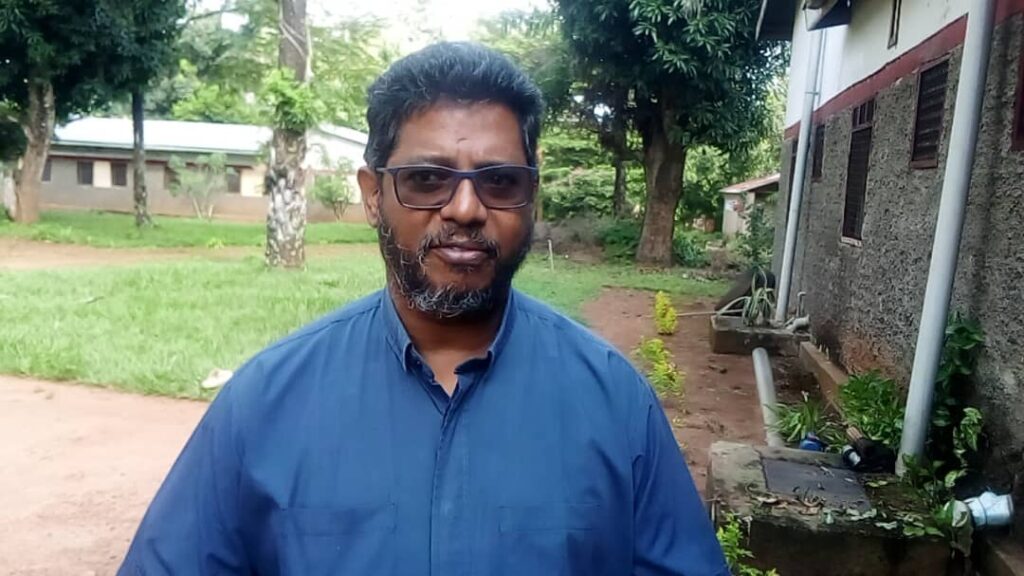
Speaking to Anisa radio the Diocesan pastoral coordinator Fr. Medeni John William who doubled as director of Palica said, the 30-day training which was conducted in three phases aims to equip the catechists with the necessary knowledge to help priests in their parishes.
Fr. Medeni said, among the topics learned in the space of thirty days of training include Liturgy and seven Sacraments, Catholic identity, the gift and fruits of the holy spirit, and the Small Christians community among others
The Diocesan pastoral coordinator added that the Diocese wants to see its pastoral work in the grass root at the level improved, citing the Catechists are vital in the pastoral work and in the mission of the Church.
“We brought 50 catechists from all the six deaneries of the diocese, that means from the thirty-six parishes in the Catholic diocese of Tambura Yambio, to see that they are strengthened and empowered”, Fr. Medine stated.
The training was conducted by the CDTY Department of pastrol coordination office in collaboration with Solidarity South Sudan.
Fr. Christ from Sirilaka working with Solidarity South Sudan who facilitated the training, underscored the importance of the training for the Catechists for effective evangelization to Christians.
“I’m working with the pastoral team to help agencies of the Church to train them and build their knowledge. This program was designed in three phases and we were able to train them with the full flesh of catechism and now they are very equipped to train other catechists in their parishes and chapels as well to teach their community”, Fr. Chris narrated.
Fr. Dominic Sasa the diocesan chancellor, acknowledged the support rendered by the Solidarity group to the catechists through imparting knowledge of Catholic doctrine.
“The knowledge that they have acquired will enable them to go to the field to help their Christians and teach them catechism. This effort comes from the Bishop of the CDTY to help Christians reach the kingdom of God. The training also will help the catechists support their priests in delivering the words of God, encourage Christians to receive sacraments, and that what we call the catechism of the Catholic Church and the primary role of the catechists”.
The Catechists were all awarded the certificates.
2023
World Council of Churches (WCC) Signs Joint Ecumenical Statement on Sudan Situation
By Sr. Henriette Anne (FSSA)
The World Council of Churches was among ecumenical organizations based in Africa and international partners that signed a 24 June joint statement on Sudan’s situation.
Their statement shared on Saturday 24th June 2023 after their online meeting on 25th May 2023, comes in response to having “listened to the current and evolving situation of Sudan and especially receiving updates on how our local partners continue facing threats and their institutions are daily destroyed,” reads the statement, which goes on to express deep concern that the conflict which started on 15 April seems to have no immediate prospect of ending.
They have in particular expressed further concern “that there are reports of unwarranted destruction and looting of civilian and public infrastructures including schools and hospitals.”
“Recalling that every state and actor in armed conflict has obligations under international humanitarian law for the protection of civilians and civilian infrastructure, the statement also calls on “civil society and the civilians to reject all forms of hatred and incitement to hatred oration in the different
The statement also echo’s the appeal of Pope Francis to the warring parties to lay down arms and call for dialogue, and goes on to reaffirm “our commitment to pray for peace and support all efforts for sustainable peace and stabilization of the country.”
They strongly condemn “all forms and acts of violence by all parties, because such acts are against the fullness of life of God’s people.”
Further, the message urges Sudanese citizens to “remain vigilant against being instrumentalized for conflict and division, and to reject all forms of violence,” and to “stand up and collectively and peacefully demand sustainable solutions to end the current violence.”
It also urges regional governments to “facilitate unrestricted movement of and support to the refugees,” among other actions.
To realize
the expected peace, the Church leaders encouraged the SAF and RSF “to Commit and return to the negotiation table by
relooking at the divergent points between the 2019 Charter and 2021 Juba Agreement with the
purpose of determining the common areas of
action and to stand steadfast and protect the children, women and people with disability
from all
forms of harm”.
They also urged them “to respect and protect the places of worship, and condemn all acts of violence and the destruction that has been targeting churches and church-based institutions, and to “ensure that that place of essential services including health centers and schools are not targeted”.
To realize peace, they called upon AU and IGAD to apply the existing mechanism for peace interventions to facilitate constructive intra-Sudanese engagement for the purpose of finding a local solution and applying appropriate diplomatic pressure including selected sanctions and membership suspension of Sudan.
They also advised them to work together with the Arab League, to reignite the Juba peace process and take immediate action to stop the repetition of genocide in Darfur and other war crimes and crimes against humanity.
Members of the different ecumenical organizations based in Africa and international partners, who signed the statement included; the All Africa Conference of Churches (AACC), the Association Member Episcopal Conferences of Eastern Africa (AMECEA), the Fellowship of Christian Councils and Churches in the Great Lakes and Horn of Africa (FECCLAHA), the ACT Church of Sweden (CoS), Bread for the World (BfW); and the World Council of Churches (WCC).
2023
Journalists and Human Right Defenders Commence a Two-Day Training to Boost Their Skills in conflict mitigation in Yambio
By Baraka
Non-violence taskforce and the South Sudan Union of Journalists have organized a two-day training at sunset hotel in Yambio Western Equatoria State to equip journalists and human rights defenders with skills in conflict mitigation, rumor control, and, non-violence communication.
The training aims to enhance the understanding of journalists and human rights defenders on the concept of conflict in relation to their work and promote effective non-violence communication strategies between Human rights defenders, journalists, and authorities without the use of violence.
Speaking at the opening of the training in the morning of Tuesday 4th, 2023, Mrs. Gisma Juma Magara the women protection officer at South Sudan Human right defender network said, the training is to build the capacity of both journalists and human rights defenders to contribute in conflict mitigation and rumor control in the society.
Mrs. Magara added both journalists and human rights defenders work to advocate for the rights of the voiceless in society.
On the other hand, Mr. Ruot George member of the South Sudan Union of Journalists applauded the training saying that it will enable the actors to have basic clues in conflict mitigation and rumor control, citing that both journalists and Human rights defenders primarily are part and partial in mitigating conflict.
2023
“We are Sending You as Ambassadors of Food Security Not Only in Your villages But Also in the Whole Country”, Says Mr. John to SARD Students
By Baraka
As students at Sustainable Agriculture for Rural Development (SARD) commence their end-term exams, Mr. John Mwendwa, the Principal of SARD institute told the students who are soon finishing their course to remember that they are sending them out as ambassadors of food security not only in their villages but also in the whole country adding that food can be a bridge to peace and it’s only together that we can cultivate for a better future.
“My message to the students is that as they are now going out, we are wishing them all the best to go and deliver what they have been taught, to put their skills into practice, and produce enough food to sustain themselves and the whole country. We are sending them as ambassadors of food security not only in their villages but also the whole country”.
Fr. Dominic Sasa blessed the students and give them words of encouragement.
In a sideline interview with Rurugene Online Newsletter. The principal underscored that “SARD institute is unique in its own way since it majors on practical skills innovative which is able to sustain the available resources, able to control pest and diseases in different ways like field hygiene, use of the organic method and use of cultural methods among others”.
He continued, “Sustainable agriculture, is advocating for sustainable use of the available resources by improving the livelihood and meeting the needs of the family adding the impact SARD institute is already seen and more so in the institute and in the individual farms of the students toward production and we look forward to providing enough food for the whole state and the country as whole. Most of the parishes are now emulating and soon we are going to be better in food production than before.
When asked about the challenges they are experiencing, Mr. John highlighted that the dropout of students after being enrolled in the institute, inadequate facilitators, lack of livestock units for practicals, students unable to pay their school fees, the low turnout of recruits, and lack of incentives for the staff among other, are the challenges they are facing.
The next intake is ongoing for September and targets all young men and women with senior 4 certificates or national examination certificates who have a passion for agriculture. They are also offering short courses for NGOs and farmers’ groups for two weeks, and 3 months for individuals or groups, and the long course takes 16 months.
SARD Institute is an initiative of the Catholic Diocese of Tambura Yambio initiated in 2021, with the sole objective to transform a peaceful, food secure, and economically enable society through improved modern sustainable agriculture.
The students are learning different components of agriculture practice with others set to complete their course units this year.
Last month, the state minister for agriculture and the bishop of the CDTY, paid an inspection visit to SARD Institute to inspect the practical learning of different components of agriculture.

